Philip Gooden - Sleep of Death
Здесь есть возможность читать онлайн «Philip Gooden - Sleep of Death» весь текст электронной книги совершенно бесплатно (целиком полную версию без сокращений). В некоторых случаях можно слушать аудио, скачать через торрент в формате fb2 и присутствует краткое содержание. Год выпуска: 0101, ISBN: 0101, Издательство: Constable & Robinson, Жанр: Исторический детектив, на английском языке. Описание произведения, (предисловие) а так же отзывы посетителей доступны на портале библиотеки ЛибКат.
- Название:Sleep of Death
- Автор:
- Издательство:Constable & Robinson
- Жанр:
- Год:0101
- ISBN:9781472104311
- Рейтинг книги:5 / 5. Голосов: 1
-
Избранное:Добавить в избранное
- Отзывы:
-
Ваша оценка:
- 100
- 1
- 2
- 3
- 4
- 5
Sleep of Death: краткое содержание, описание и аннотация
Предлагаем к чтению аннотацию, описание, краткое содержание или предисловие (зависит от того, что написал сам автор книги «Sleep of Death»). Если вы не нашли необходимую информацию о книге — напишите в комментариях, мы постараемся отыскать её.
Sleep of Death — читать онлайн бесплатно полную книгу (весь текст) целиком
Ниже представлен текст книги, разбитый по страницам. Система сохранения места последней прочитанной страницы, позволяет с удобством читать онлайн бесплатно книгу «Sleep of Death», без необходимости каждый раз заново искать на чём Вы остановились. Поставьте закладку, и сможете в любой момент перейти на страницу, на которой закончили чтение.
Интервал:
Закладка:
Whenever I crossed the river, I thought of that extraordinary feat of the Burbage brothers and the other Chamberlain’s shareholders when they transported the Theatre playhouse from Finsbury, north of the river. It was one of those stories to which we theatre folk are particularly receptive, because it presented us in a fashion that was both heroic and practical. It is not by chance that the figure who holds up the globe on top of our (yes, now I may say our!) playhouse is the mighty Hercules. For this shifting of an entire edifice was a truly Herculean labour. The epic move was the talk of the town for at least a fortnight. The lease on the Finsbury Theatre had run out. There was a disagreement with the landlord. The Chamberlain’s Company had a right to the structure, perhaps, but not to the ground it sat on. The oaken main timbers, the beams and the staves and uprights, were gently prised one from another. Pegs were eased from joints which had hardened over time, numbers were chalked across the dismantled frame, relays of carts organised to take the lumber down Bishopsgate and into Thames Street beside the river. And then in the middle of the winter of ’98, when the Thames had frozen solid, there began the great enterprise of ferrying this load of living wood across to the far side.
I envisaged the carts and the improvised sledges creaking under the weight of the frame of the playhouse — its bare bones, so to speak. I could see the panting breath of the men, the shareholder-players, as they tugged at their precious cargo, searching for a purchase on the ice. I envy these men who are now my colleagues, I envy them their part in the epic undertaking. Above them wheels all the starry heaven of a frosty winter night. I could imagine the urgency of the crossing, and the relief of reaching the far bank. Then Master Peter Street, the carpenter, had worked a near-miracle in putting together what had been taken asunder. And behold! As broken bones are sometimes stronger when they mend, so the Globe which arose, phoenix-like, from the remnants of the Theatre in Finsbury is a greater and stronger edifice than anything that is or that ever was before.
From the stern of the little ferry I saw the white playhouse on the far bank, a sight now grown familiar but still capable of making my heart beat faster. My boatman, blessedly silent apart from the occasional oath which is as necessary to the breed as breathing, thrust his oars into the stream. I hadn’t seen Adam Gibbons again, the man who had collided with me and then nearly throttled the life out of me. There were boatmen by the hundred, by the thousand, plying this stretch of the river, it is true, but London, great as she is, is also in some sense a small place and one may be sure of meeting again those whom one has encountered once.
We were now halfway across the murky river, and my thoughts turned to the household of Sir Thomas Eliot and Lady Alice and William. If I had twisted round in my seat I could have glimpsed it, one of the fine mansions on the north bank. I had lodged there for some days now and been received kindly, if distantly, by the head of the house. William’s story was that I was a player in temporary distress for accommodation. True enough. And, considering the good turn I had done the family in helping to expose the false steward Adrian and vindicate the good servant Jacob, it was the least they could do to provide for my needs while I searched for somewhere more permanent to lodge. So, William said, he had said to his mother and his stepfather-uncle. Of the more obscure reason for my being there — to observe whether there was anything ‘out of place’ — he naturally said nothing. I was his spy or intelligencer, primed to uncover the secrets of others, and this was the secret between us.
While I am halfway across the river, and nothing of interest can happen (unless the ferry be suddenly overwhelmed or the royal barge swan into view) I will recount the first of my discoveries. In the same way I will set down at intervals in the rest of this narrative the other things that I discovered inside — and outside — Lady Alice’s house. I will produce them accurately and keeping to the sequence in which they occurred or in which I found out about them. Though I now know what really happened, I will not anticipate my discovery of the final, strange truth by hinting at or foreshadowing the end.
I took my mission seriously. I even kept a little black-bound book in which I literally noted down what I had uncovered. And, to please myself, I kept it in the crude cipher which I had used once with a friend at school: that is, I simply transposed English characters into their equivalent in the Greek (so that an a became an alpha, a b a beta, and so on). To be truthful, this would not have concealed what I meant from many eyes, but it gave to my investigation an agreeably cabbalistic air. I mention all this to show how innocently I entered upon this business, as greenly as a schoolboy scrawling notes to a classmate. I wanted to please William Eliot. There is value in having a well-connected young patron — but also I had taken to him, and thought our acquaintance might turn to friendship. And I was attracted by what I might call the ‘matter’.
To begin with the body.
I spoke to the servants. I found people were willing to talk to me. I had won some credit in the Eliot household in a twofold fashion: I had assisted the unfortunate Jacob, who tended now to trail about after me when not otherwise engaged on his daily duties. And I had been instrumental in helping to get rid of Adrian the steward. He, I gathered, had been feared and unpopular with the servants because of his high-handed ways and his slyness. The story of what I, Nick Revill, had said and done in the box at the Globe playhouse had filtered through the house.
I spoke to the servants, I say. In particular, the one who had been sent up the wall on a ladder to see what what had happened to old Sir William Eliot. His name was Francis. He was a small, wiry man with a creased brow. He found it hard to keep still, and jigged and mimed, for example, his mounting of the ladder. He needed little prompting to speak about that evening. It might be the most exciting thing that would happen to him in his life, and the story he told must have been repeated a hundred times in the servants’ quarters. I was merely the latest questioner wanting to know about the mysterious and tragic death of Sir William Eliot.
I have here set down the things that I discovered in my investigation into Eliot’s death as if I were interrogating witnesses in a court of law. In doing so, I have formalised my own questions and I have condensed answers — and probably given them a coherence they did not possess — but I have not materially changed what was meant. It may seem surprising that a mere servant such as Francis should speak so frankly about his master or mistress, but I believe it to be true of these large households that they are more like parishes where neighbours gossip to one another and speak openly of the parson or the schoolmaster or the lord of the manor. And among people who live all under one roof, although they will be respectful to their betters, there is often a queer sense of equality too.
Nick Revill: When did you first understand that there was something wrong in Sir William’s house?
Francis the servant: Janet came to me, on Lady Alice’s orders. She told me to bring a ladder into the garden.
N: A ladder? Now you surely thought that was odd, Francis?
F: I thought one of the women had lost something. The wind had caught a hood or a bonnet and blown it into a tree, maybe. But, to be honest, sir, I did not think much. I did what I was told.
N: What did you see when you went out into the garden?
F: My lady and her son William were together near the door into the hidden garden.
Читать дальшеИнтервал:
Закладка:
Похожие книги на «Sleep of Death»
Представляем Вашему вниманию похожие книги на «Sleep of Death» списком для выбора. Мы отобрали схожую по названию и смыслу литературу в надежде предоставить читателям больше вариантов отыскать новые, интересные, ещё непрочитанные произведения.
Обсуждение, отзывы о книге «Sleep of Death» и просто собственные мнения читателей. Оставьте ваши комментарии, напишите, что Вы думаете о произведении, его смысле или главных героях. Укажите что конкретно понравилось, а что нет, и почему Вы так считаете.












